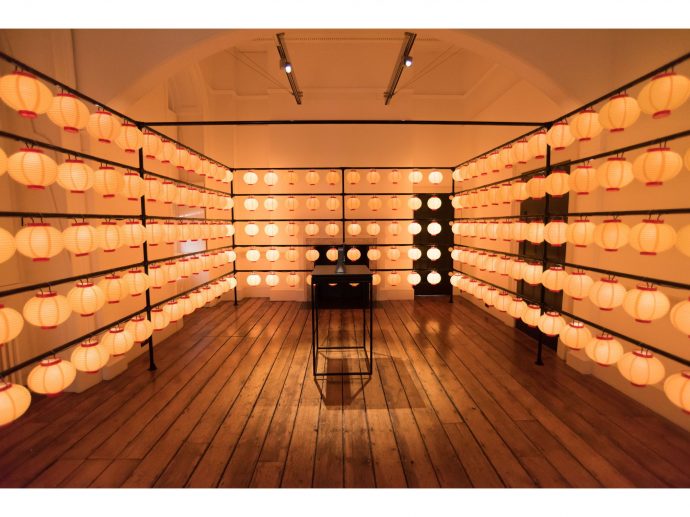Categories more
- Adventures (17)
- Arts / Collectables (15)
- Automotive (37)
- Aviation (11)
- Bath, Body, & Health (77)
- Children (6)
- Cigars / Spirits (32)
- Cuisine (16)
- Design/Architecture (22)
- Electronics (13)
- Entertainment (4)
- Event Planning (5)
- Fashion (46)
- Finance (9)
- Gifts / Misc (6)
- Home Decor (45)
- Jewelry (41)
- Pets (3)
- Philanthropy (1)
- Real Estate (16)
- Services (23)
- Sports / Golf (14)
- Vacation / Travel (60)
- Watches / Pens (15)
- Wines / Vines (24)
- Yachting / Boating (17)
Published
06/15/2021 by Taiwan Design Research InstituteSponsored by Ministry of Culture, organized by Taiwan Design Research Institute (TDRI), and curated by Bito, the "Swingphony" exhibition is taking place from June 1 to 27, 2021, in the Taiwan Pavilion at London Design Biennale, which is held in Somerset House.
Inaugurated in 2016, London Design Biennale is an annual celebration of global design organized by the London Design Festival. The theme of this year's London Design Biennale is "Resonance," which aims to explore how the power of design can set off chain reaction in people's daily life, inviting curator Es Devlin to serve as the art director as well as 25 countries, including Taiwan, Canada, Argentina, Austria, Norway, Poland, Guatemala, India, Israel, Pakistan, and Venezuela, to participate in the exhibition.
According to TDRI President Chang Chi-yi, design has the powerful ability of cultural translation, and is capable of interdisciplinary integration and innovation, thus proposing to the world unique value propositions. Taiwan Pavilion combines design with the Oriental culture and technological principles to express the tempo of Taiwan's resonance with the world, and proposes the theme of #Swingphony in response to the biennale's theme of #Resonance, hoping to provoke viewers' thoughts on design's connection with and influences on the contemporary society during the pandemic.
Taiwan has diverse cultural and religious backgrounds, and this year's Taiwan Pavilion sets off with observations on the daily rituals in religious activities, such as worshipping tours, repeated chanting, and incense burning, converting Taiwan's temple culture and religious beliefs into design elements and extracting design vocabularies of "diversity", "inclusiveness," and "resonance." On the other hand, Taiwan Pavilion invites computer industry and university physics experts to serve as technical advisors, using "metronome" as the medium to respond to the tempos created by religious actions, and utilizing the physical qualities of "resonance" to display the process of several metronomes achieving synchronicity, which symbolizes that individuals can drive the resonance of collective consciousness.
As for the design of the metronome, the pendulum originates from the "incense" seen in temples, which represents men's connection with gods. The red light that swings with the beats is the light that symbolizes future hope, whereas the metronome is the medium through which hopes are voiced. A large number of lanterns are suspended above the exhibition space to create the visual image of a Taiwanese temple, while also exerting a calming and comforting power. The "lingering smoke of incense sticks," a common element of temples, is used for the creative video of the visual concept, which renders Taiwan's exclusive colors through delicate and abstract pictures.
Taiwan Pavilion hopes to convey the warm message from Taiwan during the global pandemic; regardless of race, gender, or religion, as long as we share the same belief, we can resonate within the symphonic melody between individuals and groups, and Taiwan and the world, to present a Swingphony of goodness, belief, and empathy.
The outbreak of COVID-19 peaked last year and has since slowed down in the U.K., and against such temporal backdrop, Taiwan Pavilion has resonated with and interested the British media with Taiwan's cultural richness; moreover, the positive message and energy Taiwan longs to convey to the world can be strongly perceived. Curator Liu Keng-ming has been invited to partake in the Biennale Sessions to share on the power of using sensory design to establish the connection between individuals and groups, conjure profound emotional reactions, and ultimately facilitate people to think and take proactive actions. This exhibition that links Taiwan's technological strengths and cultural warmth shows the British design community Taiwan's outstanding design power, which will continue to catch momentum in the British society that is highly concerned with the pandemic.















